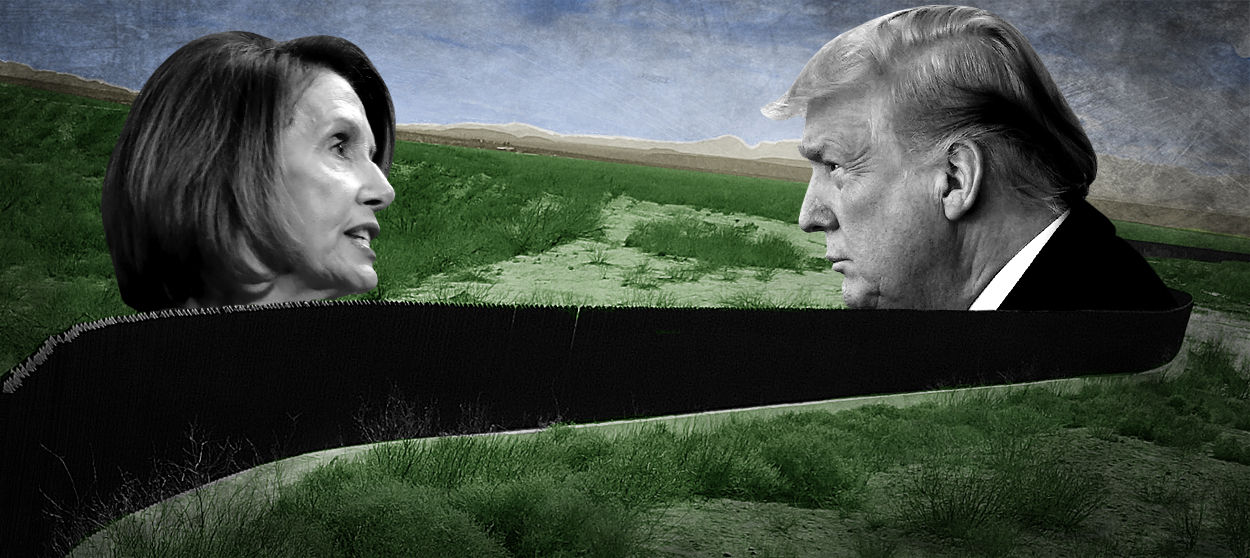The war over Trump's wall has only just begun
The president is probably going to declare a national emergency to get his precious wall. That's when the real crisis will begin.


The longest government shutdown in American history is over. Thank goodness.
But the war over President Trump's border wall isn't finished, no matter how defeated he seems. That much should be clear from the president's defiant tweets over the weekend. Instead, it's likely that the biggest and most important battles — battles that could determine the future of the U.S. constitutional order — are yet to come.
Mick Mulvaney, Trump's acting chief of staff, made that clear Sunday, saying on Fox News: "The president's commitment is to defend the nation, and he will do it either with or without Congress."
The Week
Escape your echo chamber. Get the facts behind the news, plus analysis from multiple perspectives.

Sign up for The Week's Free Newsletters
From our morning news briefing to a weekly Good News Newsletter, get the best of The Week delivered directly to your inbox.
From our morning news briefing to a weekly Good News Newsletter, get the best of The Week delivered directly to your inbox.
Almost certainly it will be without Congress, despite Trump's assertions that rank-and-file Democrats are ready to jump ship and vote for wall funding if they get the right deal. That's probably not true. It's probably also not true that Trump is ready to shut down the government a second time over this issue — given how badly the recent shutdown affected his standing in the polls, a second closure of government would defy everything we know about Trump's instinct for survival. Instead, it seems increasingly likely that Trump will declare a national emergency and assert his right to appropriate funding for the project regardless of legislative branch assent. The Washington Post reported on Sunday the president is telling advisers "that declaring a national emergency may be his best option now."
The Constitution, after all, explicitly grants Congress the power of the purse. If the president declares an emergency, it seems like it should be a relatively simple thing for congressional leaders to take Trump to court — a familiar environment for him — and have his action declared null and void. Otherwise, we live in an authoritarian state. End of story, right?
Maybe not.
As Elizabeth Goitein points out at The Atlantic, Congress has handed a lot of its potential authority to the president over the decades, in legislation meant to let the executive branch move quickly if the nation ever does enter a state of emergency. The result is that "this legal regime for emergencies — ambiguous constitutional limits combined with a rich well of statutory emergency powers — would seem to provide the ingredients for a dangerous encroachment on American civil liberties."
A free daily email with the biggest news stories of the day – and the best features from TheWeek.com
It also allows encroachment upon legislative authority. Congress — not the president — possesses the power to tax, yet Trump has waged his trade wars against China, Canada, and other nations with tariffs he's allowed to impose thanks to those emergency powers. Republicans in Congress have hated those tariffs — but they've mostly deferred to the president.
We can probably expect the House of Representatives, led by Speaker Nancy Pelosi (D-Calif.), to be a bit more aggressive in asserting its authorities. (Indeed, that's already happened.) If Trump declares an emergency in order to fund the wall, you can expect the House to sue.
What would the courts do? That's harder to predict. We do know that Trump and the GOP-held Senate have spent the last two years filling the federal courts with as many conservative judges as they can possibly get appointed. We also know that Trump expects his appointees to show him some personal loyalty. That doesn't mean they will, obviously, but it does mean the courts might be more of a wild card in deciding the matter than a simple reading of the Constitution would suggest.
This moment has seemed likely for some time. Trump's authoritarian instincts are apparent, so it was always the case we'd reach a point in his presidency at which he would be tempted to make Congress officially irrelevant. As my colleague Matthew Walther pointed out a few weeks ago, declaring an emergency allows Trump to save face and move on from the issue — after all, deferring final judgment to the courts could take months or years.
Declaring an emergency and dumping the issue on the courts will feel better than a shutdown — no missed paychecks, no airport slowdowns — but it might be actually worse for the Constitution. If the courts should somehow rule in Trump's favor — the meager limits restraining his presidency, or any American presidency — will be greatly loosened.
Trump's fans are fine with that. They are short-sighted — and should consider if they're ready to let Democratic presidents have the same power they want Trump to assert. Is it so difficult to imagine, say, a President Elizabeth Warren declaring that Medicare-for-all is necessary to American national security? Or any president using the powers for far worse reasons and to far worse effect?
Trump's opponents spent much of the weekend exulting in the president's capitulation on the shutdown. You can't blame them. But there's a longer game being played here. The war over the wall has just begun.
Joel Mathis is a writer with 30 years of newspaper and online journalism experience. His work also regularly appears in National Geographic and The Kansas City Star. His awards include best online commentary at the Online News Association and (twice) at the City and Regional Magazine Association.
-
 ‘Care fractures after birth’
‘Care fractures after birth’instant opinion Opinion, comment and editorials of the day
-
 Shots fired in the US-EU war over digital censorship
Shots fired in the US-EU war over digital censorshipIN THE SPOTLIGHT The Trump administration risks opening a dangerous new front in the battle of real-world consequences for online action
-
 What will the US economy look like in 2026?
What will the US economy look like in 2026?Today’s Big Question Wall Street is bullish, but uncertain
-
 Bari Weiss’ ‘60 Minutes’ scandal is about more than one report
Bari Weiss’ ‘60 Minutes’ scandal is about more than one reportIN THE SPOTLIGHT By blocking an approved segment on a controversial prison holding US deportees in El Salvador, the editor-in-chief of CBS News has become the main story
-
 Has Zohran Mamdani shown the Democrats how to win again?
Has Zohran Mamdani shown the Democrats how to win again?Today’s Big Question New York City mayoral election touted as victory for left-wing populists but moderate centrist wins elsewhere present more complex path for Democratic Party
-
 Millions turn out for anti-Trump ‘No Kings’ rallies
Millions turn out for anti-Trump ‘No Kings’ ralliesSpeed Read An estimated 7 million people participated, 2 million more than at the first ‘No Kings’ protest in June
-
 Ghislaine Maxwell: angling for a Trump pardon
Ghislaine Maxwell: angling for a Trump pardonTalking Point Convicted sex trafficker's testimony could shed new light on president's links to Jeffrey Epstein
-
 The last words and final moments of 40 presidents
The last words and final moments of 40 presidentsThe Explainer Some are eloquent quotes worthy of the holders of the highest office in the nation, and others... aren't
-
 The JFK files: the truth at last?
The JFK files: the truth at last?In The Spotlight More than 64,000 previously classified documents relating the 1963 assassination of John F. Kennedy have been released by the Trump administration
-
 'Seriously, not literally': how should the world take Donald Trump?
'Seriously, not literally': how should the world take Donald Trump?Today's big question White House rhetoric and reality look likely to become increasingly blurred
-
 Will Trump's 'madman' strategy pay off?
Will Trump's 'madman' strategy pay off?Today's Big Question Incoming US president likes to seem unpredictable but, this time round, world leaders could be wise to his playbook
